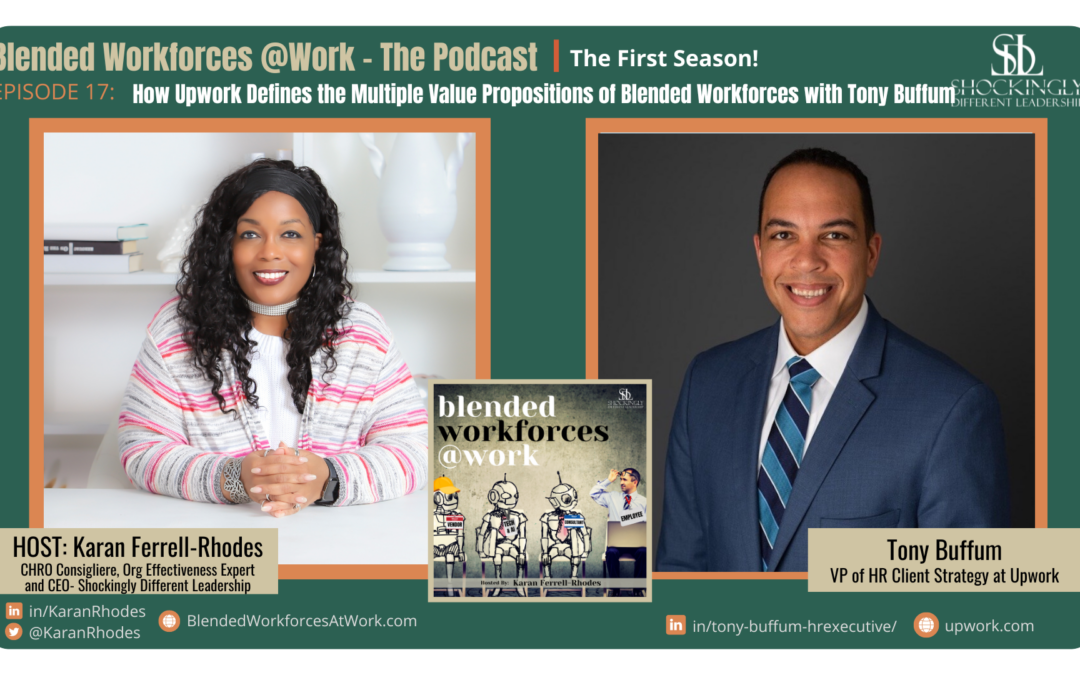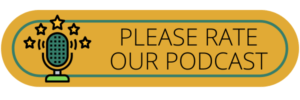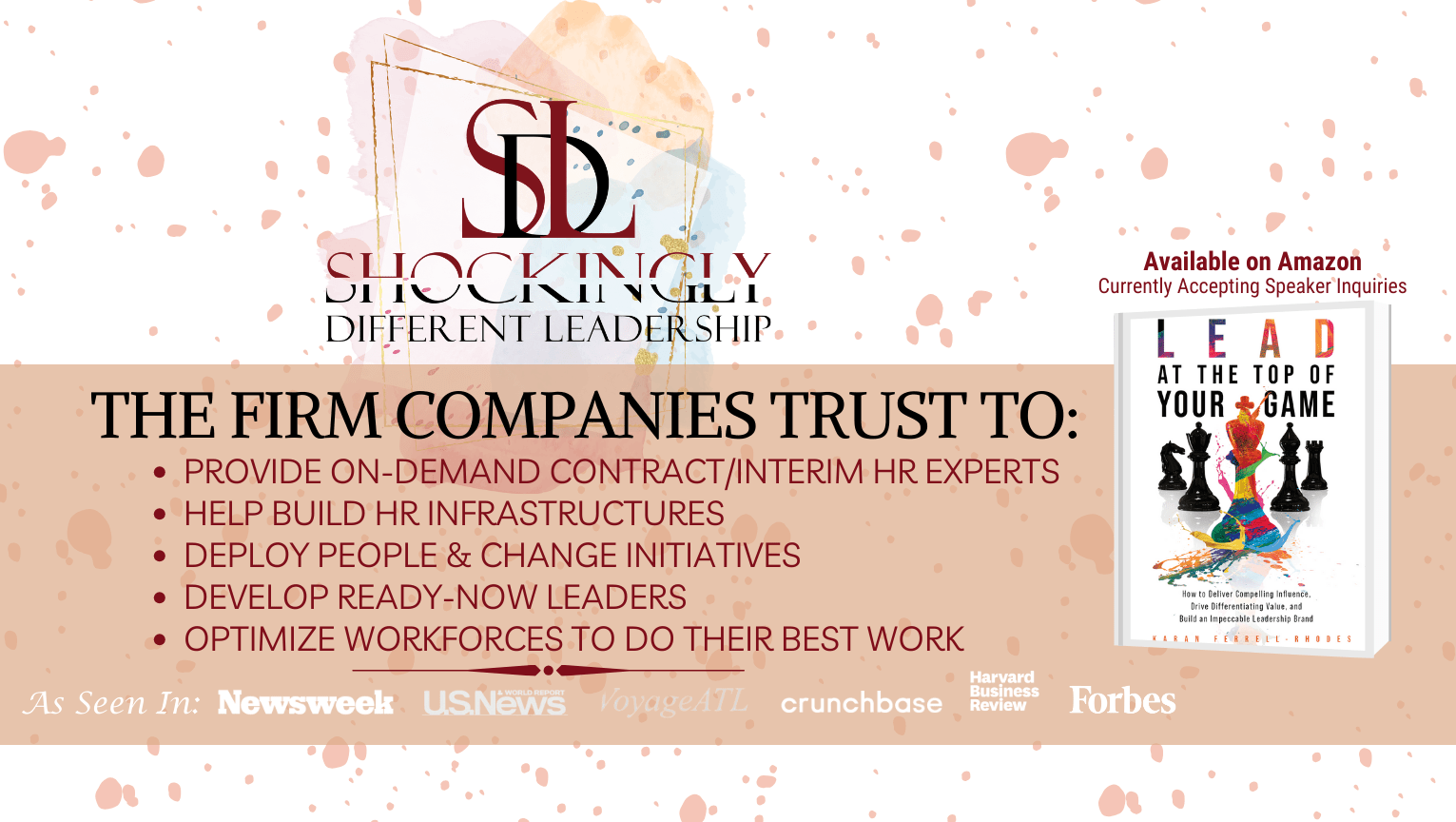IN THIS EPISODE, KARAN FERRELL-RHODES INTERVIEWS TONY BUFFUM.
In today’s dynamic work environment, blended workforces revolutionize productivity by fusing full-time staff with diverse freelancers, creating unparalleled agility. This approach not only accelerates project delivery but also infuses organizations with fresh perspectives, turning traditional talent acquisition on its head and setting the stage for a flexible, future-ready workforce.
Tony Buffum is the VP of HR Client Strategy at Upwork. With over 20 years of global HR leadership experience, Tony excels in driving enterprise growth and addressing complex HR challenges. His notable past roles include transformative positions at FLIR Systems and Stanley Black & Decker, and he currently chairs the PEI Human Capital Forum and advises at SemperVirens.
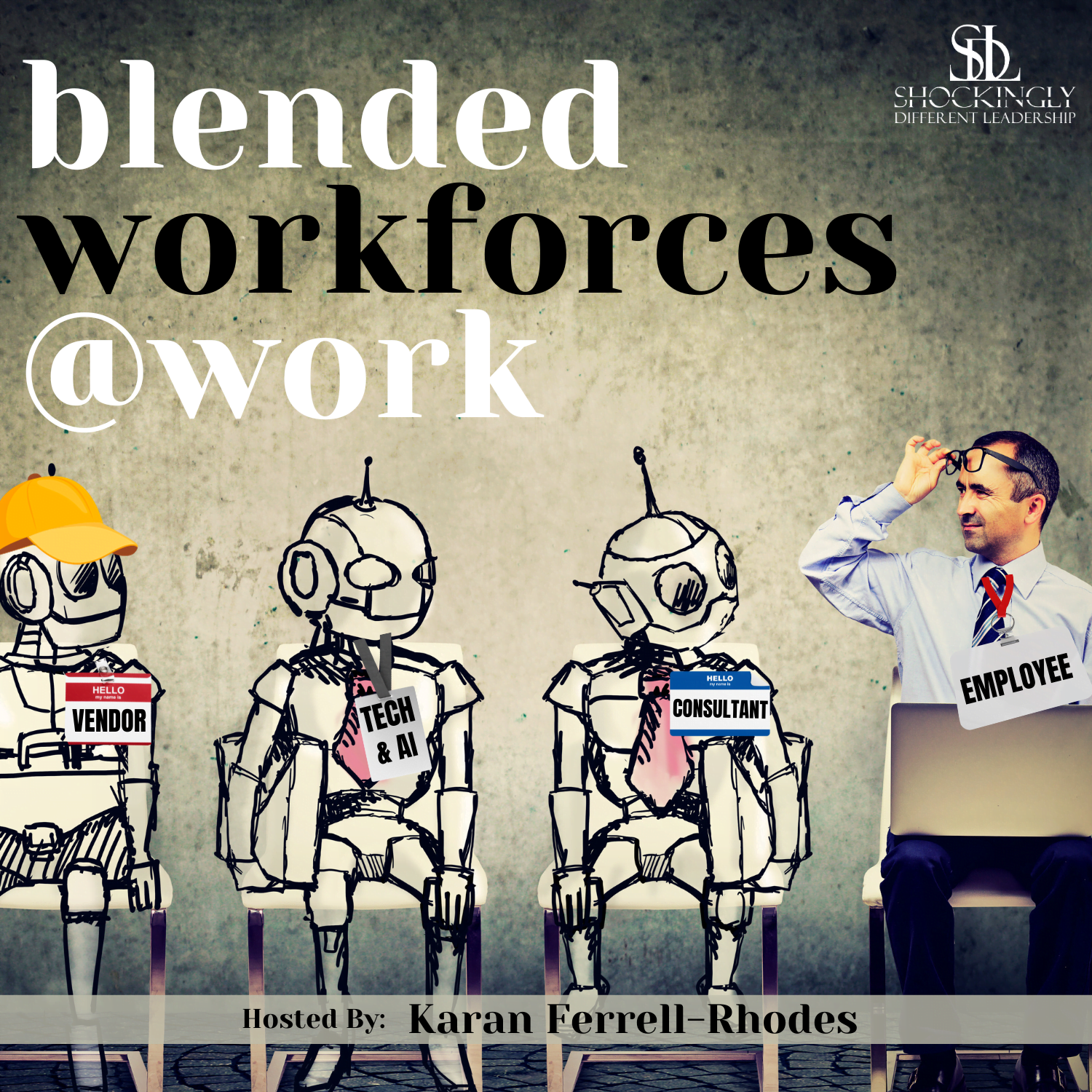
Posted by
SDL Media Team
Rather view our video podcast?

WHAT TO LISTEN FOR:
- Why is it challenging for large enterprises to adopt agility?
- What are the main benefits of having a blended workforce?
- How does a blended workforce enhance speed and adaptability?
- How can embracing the access mentality benefit organizations?
- Why is flexibility and agility necessary for organizations today?
- What role can AI play in the future of HR?
- What is the digital transformation gap in HR?
- How can AI help HR departments adapt to digital transformation?
- What are the main challenges of transitioning to independent work?
- How important is self-marketing for independent professionals?
“The biggest challenge of blended workforces is the change management effort.”
FEATURED TIMESTAMPS:
[02:51] Tony’s Personal Life
[04:51] Tony’s Journey from Early Career Steps to Becoming a VP at Upwork
[09:24] Adopting Agility in Large Enterprises
[12:12] The Game-Changer of a Blended Workforce
[16:09] Paradigm Shift in Talent Acquisition
[20:51] Embracing Flexibility and Agility in the Modern Workforce
[22:11] AI for Enhanced Productivity
[26:05] Bridging the Digital Transformation Gap in HR
[28:36] Signature Segment: Tony’s entry into the LATTOYG Playbook: Balancing Freedom with the Need for Self-Marketing
[31:48] Signature Segment Tony’s LATTOYG Tactic of Choice: Leading with Strategic Decision Making
[34:15] Explore the Global Talent Marketplace with Upwork!

ABOUT TONY BUFFUM:
Tony Buffum is VP of HR Client Strategy at Upwork. As a vital member of the senior-level executive client strategy team, Buffum is responsible for accelerating the growth of current and prospective Upwork enterprise clients, helping them solve HR challenges related to finance, procurement, and talent transformation. Buffum is an accomplished HR professional with over two decades of experience leading global HR teams and driving transformational change in company culture, organizational design, performance management, and employee integration and engagement.
He joined Upwork after several noteworthy leadership positions, including chief human resources officer (CHRO) at FLIR Systems, VP of global human resources at STANLEY Security, and VP of human resources at Stanley Black & Decker. Alongside his role at Upwork, he serves as Chairperson of the PEI Human Capital Forum. He is the HR Venture Advisor at SemperVirens, an early-stage venture capital fund investing in technology transforming healthcare work and financial wellness.
Buffum graduated from Cornell University with a B.S. in Industrial & Labor Relations.
LINKS FOR TONY:
- Website: upwork.com
- LinkedIn: linkedin.com/in/tony-buffum-hrexecutive/
ADDITIONAL RESOURCES FOR YOU:


Episode Sponsor
SDL is the go-to firm companies trust when needing to:
- supplement their in-house HR teams with contract or interim HR experts
- implement leadership development programs that demonstrate an immediate ROI and impact on the business

Episode 17 | How Upwork Defines the Multiple Value Propositions of Blended Workforces with Tony Buffum
Tony Buffum 00:01
And so with large enterprises, they’re adopting more of this agility, flexibility approach of having a smaller core of full time employees and leveraging a much bigger team of not just freelancers or independent talent, but lots of different resources. I call it the workforce ecosystem approach.
Karan Rhodes 00:01
Blended workforces are one of the hottest talent strategies today, where employers are using a mix of traditional employees with external resources like independent contractors, coaches, consultants, vendors, and technology solutions, all in order to enhance competitiveness, ensure cost flexibility, and expedite business goals. But how are the successful companies infusing blended workforces into their business strategy? And what are the critical success factors and pitfalls to avoid during implementation? And on the flip side, what does it really take for suppliers to improve their chances of finding and landing contract opportunities? The devil is in the details, my friends! I’m your host, Karan Ferrell Rhodes, and it’s time to get smarter about Blended Workforces at Work! Hello, my superstars This is Karan and welcome to another episode of the blended work versus at work podcast. We are so thrilled to have you join another episode. And, boy, you’re gonna be glad to listen to this episode because we have a tremendous guest on queue. On today’s show, we have Tony Buffum, who is the VP of HR client strategy at Upwork. And I know many of you are familiar about Upwork. For the few out there that may not be Upwork is a global marketplace where organizations can find and offer freelance jobs in various fields and skills. At Upwork, Tony is responsible for accelerating the growth of current and prospective Upwork enterprise level clients, helping them solve their HR related HR challenges related to finance, procurement, and talent transformation. Talk about the perfect guest for the Blended Workforces at Work podcast. He is the epitome because he sees how companies are leveraging external talent to help them grow and remain competitive. So welcome to the podcast. Tony.
Tony Buffum 02:04
Thank you so much, Karen. It’s a pleasure to be here. Thank you.
Karan Rhodes 02:07
Oh, it’s such a pleasure to have you. I told you right before the show, I could talk to you for hours. But since we don’t have hours let’s, you know, jump into some of the topics. But before we do, we’d love to learn a little bit more about you personally. So for just as much as you feel comfortable. Would you give us a sneak peek into your life outside of work?
Tony Buffum 02:28
Yeah, I’d love to the first thing I think of is I have three kids 15, 12 and a half, and 10. The youngest is my one daughter, the two boys older than that.
Karan Rhodes 02:40
Oh, nice.
Tony Buffum 02:40
They’re awesome. They’re these great ages where we can do a lot of fun, we can compete together. I never let them win at anything. So when they do which they’re starting to, really, it’s affecting my ego. But I’m super proud of them. Especially we helped me play basketball a lot.
Karan Rhodes 02:56
Nice.
Tony Buffum 02:57
In addition to that, we talked a little bit about dogs before I have a bernedoodle. It’s about two and a half years old. And he’s just a sweetheart, like the most loving dog that I could imagine. So he’s terrific. And I live in Charleston, South Carolina, which is beautiful. I grew up in upstate New York, in Rochester. So this is a dramatic difference in terms of the climate, in a lot of ways. But between Rochester and college, you know, also in upstate New York and being here. I’ve lived in about eight or nine different places. I’ve moved around quite a bit. And this is where I’ll have some roots, at least until all the kids are out of school. Probably longer than that, but I really enjoy her.
Karan Rhodes 03:36
Oh, well, you know, I’ve been in Atlanta, we’re not too far from you.
Tony Buffum 03:41
Yeah! I spend many weekends in Atlanta with my middle son’s travel basketball team. Oh, a lot of tournaments that are in the Atlanta area.
Karan Rhodes 03:51
It’s the Metro of the South. So I can imagine, but at least you have the change of seasons. Not too hot, not too cold. Where you are as well, right?
Tony Buffum 04:01
Yeah, I’m happy with it. It’s really nice.
Karan Rhodes 04:03
Very nice. Well, thank you so much for sharing that tidbit we really appreciate. All right, let’s get down to brass tacks a bit. Let’s start out by featuring you a bit tiny and I know you’ve had an you know, a wonderful extensive career. But can you share just a peek into how you started your career? And now how it’s progressed to now being a VP at up work?
Tony Buffum 04:28
Yeah, I think not everybody gets right out of high school and says I want to be in HR. But when I applied to I applied to Cornell’s Industrial and Labor Relations program, knowing I want to do something in business and when I saw what the curriculum was courses in, you know, labor history, labor, economics, organizational behavior, human resources, collective bargaining, like those all seem like things that I would really enjoy, just intrinsically interesting and motivating. And I feel like I was very lucky because I absolutely enjoyed everything about that program. It was stimulating. Interesting. And it also got me exposed to HR. So one of the first internships I had was with IBM at their headquarters and executive comp, which was a very cool space to be in a lot that was felt like it was over my head. But I felt fortunate to be included. And I went to Texas Instruments I was responsible for leading our student program on during a co op, and also supported a diversity office, which I really enjoyed. I felt like it was still something that was just new to organizations. And I returned to TI for a couple summers after that, I really love that business. I love what they did. I love the changes it was going through. But when I graduated, I took a job with General Electric’s HR leadership program. And I’m sure a lot of people know, GE was well known for its leadership development, it was the prime place to be, and especially in HR, I thought this was the penultimate program. And I still believe that it’s the one of the best programs in the world. Yes, I love that. I love the opportunity. Like I kind of alluded to earlier to move around after every roughly eight months, not just doing different HR assignments, which I did in Union relations in you know, typical kind of corporate generalist support, but also, across functional rotation I did, I spent a early part of my career in manufacturing plants. And so I managed the sheet metal fabrication department for eight or nine months. So I liked that I got to do things outside of just my function. And I stayed GE for a couple of years after that within its lighting business. Also still manufacturing, but also owning all of what we called organization and staffing, which is all of the internal and moves external hiring but planning succession in our annual review process, which there and I think like a lot of organizations, there is an annual event, but it’s an ongoing effort, especially for the HR leaders that kind of direct traffic. And after the four years total at GE I left to go work for the Stanley works, it provided me an opportunity to move to location want to be in which happen to be Allentown, PA at the time and support a business that was primarily focused on sheet metal fabrication. So it just felt like this great fit. But it was my first global HR management role of a small division that just grew over time over you know, about a 10 or 12 year career with Stanley, eventually Stanley Black and Decker, then eventually chief HR officer at FLIR Systems, and then eventually Upwork.
Karan Rhodes 07:47
Wow, what a journey in a fantastic experience, I think we have you and I have that in common I was, quote unquote, that girl who is assigned to all kinds of special rotations and projects of as long as it had to do with the strategic side of HR or transformations. That was the one that was tapped on. And I love the variety. I love, love, love the variety of opportunities. And it sounds like you got that as well, your career? Well. Let’s talk a bit about Upwork. And the reason why you’re so ideal as a guest on our podcast is because you see, especially at the enterprise level, I mean, I was 14 years at Microsoft, and then previous at&t, Comcast and other enterprise level. And I know there is a different dynamic at the enterprise level than there usually is at the SMB level, as it relates to a lot of things. But since you have experienced with the working with enterprise levels, can you share what you’ve seen as far as trends on how they’re leveraging Upwork to scale up and scale down their teams in order to get work done?
Tony Buffum 09:01
Yeah, we’ll start with it is different at the enterprise level, I’d say primarily large, these large, big, big companies, lots of employees in lots of bureaucracy typically are hard to get them to adopt, and a different way of doing things. Because they’ve done it for decades. And it’s kind of like if it’s not broke, don’t fix it. But really, it might not seem broken yet. But if it’s not caught up with the way that talent is working, and will be working, it is broken, you just don’t see it. And so with large enterprises, they’re adopting more of this agility, flexibility approach of having a smaller core of full time employees and leveraging a much bigger, you know, team of not just freelancers or independent talent, but lots of different resources. I call it the workforce ecosystem approach, where they have a lot of different routes. resources and levers that they can pull on in order to get things done or source work within the organization. And that’s some functions even within those large enterprises get it before others. But once they see how effective that is, how it’s working, enabling a lot more flexibility and agility. But I think most importantly, now, access to new technology, other functions start to get on board as well.
Karan Rhodes 10:26
Oh, I love that. And, you know, the way we define blended workforces, it’s not only the traditional full time employee talent inside of organizations, but it’s the external resources, vendors, suppliers, independent contractors, you know, blah, blah, blah, you name it. And we include Intel technology into this as well. Because, you know, managers and leaders are having to think about all of these entity entities as they do their workforce planning and deciding how to best get work done in a cost effective manner that keeps them competitive. And so we know, blue refers is a big umbrella. And there’s, you know, a lot of aspects around blended workforces, you know, your remote work versus on site, and all of that kind of thing. But in New York opinion, what do you think, is the power of employers really considering a blended Workforce Strategy and to their people strategies? And then what do you think is a downfall or a roadblock they frequently hit? Or a blind spot? That is sometimes a negative if they don’t look at it deeply? So what’s the something great about the Linnet Workforce Strategy? And then what’s something they need to watch out for?
Tony Buffum 11:50
Okay. Well, there’s a lot, that’s great. But I would say the number one thing, like, you know, I talk to all functional leaders, CFOs like that they are enabled to leverage costs a lot more efficiently. And HR leaders love it, because they have a lot more options for accessing all sorts of diverse talent, and all sorts of different skill sets and capabilities. But to me, the number one value proposition is speed. When you have different levers and different places, you can go for talent, and you can bring it all together to work, cohesively collaboratively enables you to get the talent that you need, when and where you need it so much faster than the traditional paradigm of only hiring full time employees. And that blended workforce enables organizations not only to get talent and quickly, but adapt quickly to changes in the market changes with their peers or within their own organization. And that adaptability that enabled and provided by speed. Is it just a game changer and true differentiator for organizations that embrace it. At the same time, the biggest challenge that anybody that’s thinking about a blended workforce, or I’m sure anybody working through it now, is that change management effort, this is a paradigm shift. So often say we no longer live in a world like my dad went to work for Xerox for 42 years retired with a pension. Like that was a different environment. And frankly, organizations were a bit more paternalistic, and people look to companies to keep them on board for a long time. Now we see the next generation, more than 50% of Gen Z enters the workforce, not looking for traditional jobs. So that’s that is mind blowing for probably a lot of listeners, but definitely hiring managers to think, well, then where am I supposed to find this talent. And trust me, it’s getting harder and harder because the global workforce participation rate is decreasing has been for the last 20 years is going to continue, while population rates are shrinking. And so it’s going to be harder and harder to find that talent, if the only pond you’re fishing in for talent is full time employees. But at the same time, there’s this massive pool of town that’s increasing every year made up of freelance and independent contractors, and all sorts of other types of employment or work, providing work, whatever it might be the biggest challenges that’s just different. It’s different in a lot of ways. It usually involves remote work at a rate that still a lot of leaders and managers aren’t comfortable with. And that’s just the start. So the biggest challenge is the change management effort to get other leaders once you’re a bot and in your champion, but other leaders to recognize the value, shake the stigmas away from, you know, different types of workers and realize this is a major and critical piece of the future of work.
Karan Rhodes 14:56
I couldn’t have said it better myself. That is so true, I guess I totally high five years. On that, because it is the future and leaders, especially executive leaders, their ability to be able to to drive the workforce to embrace. How will blended workforces are of the now and of the future. It’s here it’s needed for so for companies to make remain competitive, it’s just truly, totally important. Now, I know you had a perspective on talent access versus talent acquisition. So why is it important for companies to kind of rethink their or their perspective or have a mind shift of talent access versus talent acquisition? Tell us more about that.
Tony Buffum 15:47
I think this is at the nucleus of that paradigm shift we were just talking about. When you think about it, this idea of acquisition, I always say organizations have this mentality that they acquire, and they own their talent, and everything they design, develop and dream. It’s all like it belongs to them. Right? best example I can get about, I had a conversation with some ch rose. And I had one, you know, of course, talked about up work, but talked about this whole paradigm shift. And as a leader, say, Tony, you know what my issue is, with your platform, is I worry about all the people I have in my team on my technology team that are already, you know, working on your platform as like a side hustle. And kind of flippantly. My reaction was that sounds like a you problem intentionally. Because there’s a few things like one, to me, the first questions you should be asking are, why are they also potentially on this platform, they’re not making enough money, they feel like they have to supplement their income, right? They’re not engaged enough, what they’re doing is no longer exciting and motivating to them. So they want to explore things that are interesting. They’re concerned about their job security. So they want to create an alternative career option and safety net, but there’s a lot of different reasons, right. But I think what’s more important, is the talent acquisition mindset behind that comment, which is own you, which exactly which I own you. So what that leader to me is really saying is if they have extra time, why am I not getting that time? Yeah, they should be giving that back to me. And to me, what they’re missing is, if they’re doing their job, and they’re meeting all your objectives, they’re giving you what you pay them to do. And if they aren’t, then performance, manage that, like, you’re an HR leader, like drive the performance management process, get them back up to speed, but if they are, the rest of their time, belongs to them. And that is more of the access mentality, this kind of abundance mentality of, Okay, I’m getting what I contracted and what I expected to get out of this employee, which is defined, well defined, there’s goals, measurements, and you know, an annual process around evaluating and recognizing that. So once you’re getting that whatever they want to do belongs to them, it doesn’t belong to me, just because they’re my employee. And that’s, that’s an important shift. Because once leaders, especially HR leaders, but all leaders embrace that thinking, it also opens up the idea that all this other talent that doesn’t necessarily want to just work for one company, it also provide their skills, their capabilities to yours, if you just open up the aperture to make it happen. And yeah, they’re gonna go work for other companies, that’s okay. Because that benefits you, they’ll come to a position with different ideas, this diversity of thought, because they did a similar project for a different company that maybe had a different approach that they can suggest. And that had benefits to me that benefits everybody. So I think embracing that opens up so many doors. And it also opens up this workforce ecosystem, that we’re talking about this blended workforce model that brings so many other benefits to the organization and the talent that’s engaged with that organization.
Karan Rhodes 19:13
Gosh, we’re so aligned in that. Thank you. I always say, you know, as long as an employee is doing this central functions of the job, to a satisfactory level, that is the employment contract between you and that individual and if they’re doing it, and they can do it and four hours versus eight that’s on them. But as long as you’re again, high performance or what you paid for those perfect, and the rest to your point, they should be able to flex and do other things. It is I do know it’s gonna take time to kinda infuse that into the culture, especially since a lot of the executive leaders are older than some of our younger folks, but I believe over time and it will change because it has to be just going, you know, 50 million miles a minute. It’s hyper competitive out there. There’s so many global changes and geopolitics going on, it’s, it’s just gonna be critical for the future. And so those companies are able to recognize that they need a workforce that needs more flexibility in how they get work done, those are going to be the ones are going to be sustainable for the long gaps in my Karan’s opinion.
Tony Buffum 20:28
I mean, like you said, it like, we couldn’t be more lockstep because the as much as companies need to adapt and change, just look at the S&P 500, you know, even 20 or 30 years ago, much less 10. And how many companies are gone?
Karan Rhodes 20:44
Yeah,
Tony Buffum 20:44
Like, if you can’t create adaptability, flexibility, agility within your organization, to meet the needs of your customers, and therefore your organization designed today, and you’re going to struggle fall behind and someone is going to disrupt you. And so like, that’s why I think it’s so important to embrace this new way of working because it is a new way of working. It’s not abandoning full time employees, like neither you or I saying employees are a thing of the past. No, no, not at all, saying it’s an ad strategy, not an or.
Karan Rhodes 21:17
Correct. Let’s underscore that. Yes. That Tony, I’d be remiss if I didn’t bring up, you know, this day and age’s is hot topic, which is Gen AI. And it’s impacting every industry, every job profession, any every business, everything. So I’m just curious, in your opinion, with the rise of GE and AI, how do you think is gonna impact the way HR leaders think about hiring and constructing their workforce? Yeah,
Tony Buffum 21:48
I mean, we see headlines about, you know, AI replacement for jobs, kind of on a regular basis, which I personally think, is hyperbole. I think the reality, and I love this, this is saying we hear all the time, I’m just going to repeat it, it’s not AI that’s going to replace people in jobs, it’s going to be people using AI to replace people that don’t. Yeah, so understanding that but also understanding that the point I made earlier, like we have this, this constant trend of less and less people entering the traditional workforce globally, right, we also have this great Korn Ferry article released earlier this year, about the multi trillion dollar skills gap and talent gap that we’re that we’re, you know, facing by 2030, there is a need to maximize productivity and efficiency now, and here comes generative AI, to where we take a look at what we do, how much of the tasks of what we work on in our jobs, that’s less value added, that is administrative, or they could just really be enhanced with faster, better knowledge or, or, you know, better triggers of our creative thinking, the more that we can take off our plate that doesn’t add that value and maximize the true value critical thought, empathy, all those things, judgment that people have that the technology won’t, the better, more productive and effective every function will be. So I really see it opening up the aperture for all functions. But if we focus in on HR for a second, yeah, sure. One of the things I love the most throughout my career is being that strategic trusted adviser to a business leader, or for a while my CEO, there’s always work that’s kind of burdened by that, that keeps you away. And at every level, I think that’s true, whether you’re an HR manager or a specialist, and you’re, you’re trying to influence a hiring manager on a decision, whatever it might be. Our value comes in really understanding the talent, understanding the organization, the cultural fit, trying to make the best decision for the organization that’s possible. And when we can have more time to understand the business, the balance sheet, the business model, everything about how operates and bring all that together, the value we provide for our leaders is significantly higher. But we need technology to help pull a lot more of that off our plate. And I think that generally, I mean, I already see it, but I think generative AI is going to massively impact the HR function in particular, and free them to be those value added advisors that they can and I think want to be.
Karan Rhodes 24:40
I agree, I think, though, there’s a gap on the learning curve for most HR teams and leaders, so they’re having to try to catch up and really understand what it means for them. So yes, and that and I also think that I always love to joke I’ve never yet in my team When he plays your courier have found an overstaffed HR function. No have I’d love to hear it. But usually, they’re usually understaffed, or they have more work than the team can do and less time for to your point, the strategic side, people side of business. So having AI help out with a lot of those tasks that that can that are ideal for the technology, and moving HR closer to what you said the business and helping think through strategies and how that’s gonna affect the workforce, I think will be invaluable moving forward. I’m very excited about it.
Tony Buffum 25:43
Yeah, absolutely agree with that point on the gap. And I think there’s a few things that that drives, one, you know, there was a survey done by vouloir. Digital is their digital transformation survey. Now, this is back in 2021. But they surveyed every function of businesses. And what they found out, which isn’t surprising to you, I’m sure is that HR is way behind every other function in terms of its journey towards digital transformation. A couple that with a safe survey that I think is from 2022, that showed that the majority of HR leaders or majority of HR professionals want to leave the function entirely. It’s something like 62%. And to me, those are related like I don’t want to necessarily, there’s causation, but there’s definitely a correlation. Right? Because at the pace, and you mentioned this already, at the pace that the macroeconomic conditions are changing, there’s so much more that’s brought in the workplace, there’s so much higher expectations for HR to help the organization navigate this, but they haven’t, they haven’t kept up with the rest organization on that digital journey. It’s just feeling more and more like a burden. And the more that we can do to help HR functions, adapt digitally lean in to new digital technology, and embrace new processes, systems and tools, the more I think the HR function can help itself be prepared to take on new things like generative AI.
Karan Rhodes 27:15
I agree. I agree. Well, I know I don’t have a lot of more time left with you. But I’d be remiss if I didn’t give a little airtime to the of their side of LINET workforces, meaning the external workforce side. So I’m curious, your thoughts on how individuals who are interested in freelancing or putting their names up for opportunities on say, like Upwork? How can they best prepare, and to be considered as a finalist of choice, if you will, because I’ve found that there are a lot of people that leave corporate America or leave other experiences, hang out a shingle, but really haven’t embraced the business of running a business. So I’m just curious, how do you all prepare and onboard your people that sign up for Upwork, to be prepared to be placed at a company?
Tony Buffum 28:13
Yeah, I think it’s a really good point, I talked to a lot of HR professionals I used to work with that will say, Tony, I’m getting ready to leave, or I just want to change, and I want to be independent, I want the freedom and I want to work with different companies and not just one. And always my I’ve never done it. So I’m not speaking from experience, even Upwork. I’m one of their full time employees. But I always what I’ve learned from talking to so many other consultants and people that work independently is you don’t spend nearly as much time now in your full time role marketing and generating new business. This is now a big part of your responsibility if you’re going to be independent, and own your own business, and even if your own businesses, you and your brain and your experience and, and your heart, all of those things you’re going to have to market and sell. So if you’re getting on a platform like ours, there’s certainly tools that people can use to understand how they can better magnify their profile, how they can use language that’s going to connect with employers. In fact, we have a great eight generative AI tool that helps walk people through not only how to set up their profile, maximize it, but also how to find the right jobs and the right fit that they can bid on to improve their chances of winning that work. So we’re already leveraging that generative AI tool on both sides of the platform to enable better matching better experience. But most importantly, better traction out of the gate because certainly folks that get on a marketplace like ours are many of the hundreds. When they don’t start finding that work. They get discouraged, understandably. So we want them to have the best experience possible and help them along that way. But at the end of the day, they’ve got to be committed to generating kind of doing some of that commercial work generating the business and selling themselves a little bit because that’s their business now themselves.
Karan Rhodes 30:12
And in full disclosure listeners, I am an Upwork customer, they did not pay me to get Tony on the podcast, he was so kind just to do that the kindness of his heart, but I am Upwork customer and Upwork fan, and we can’t talk about and teach bundle workforces we’re not doing it ourselves. So we appreciate the company. And all you do that quickly. Tony, before we let you go, you know, we have a signature question, we love to ask our guests. But it comes out of our own research study on high performing leaders and what it takes to differentiate yourselves when you’re executing on various leadership initiatives. And we have seven that came out of our research that were universal, no matter one’s job, or profession or industry. And we asked you, which one of the seven really popped for you and you were so kind to share that leading with strategic decision making really resonated with you. And for my newer listeners, this is all about your ability to make good decisions yourself, or lead a great decision making process with teams or individuals that you’re working with. So curious minds want to know, Tony, why did strategic decision making really resonate with you?
Tony Buffum 31:25
You know, I’ve had the privilege to lead many global HR teams. And when I thought of that, that particular that particular skill set or capability, I thought, you know, I make better decisions, because I work closely with a really bright and smart team. So, you know, having a team to help me make great decisions allows me as the leader to make better decisions. But all of that starts with data, it always has to be database, you have to understand your business, like we talked about earlier, and understand whatever supporting information can help you make things that can often be emotional, more concrete, but starting with the data, and then continuing, of course, with a vision mission, purpose of the organization in mind, I think as a strategic leader, that always has to be the guiding light. And you’re thinking long term and vision mission purpose are typically long term guiding lights towards what do you want to do with your organization, and what’s in its best interest. And then finally, last, but not least, at all, leveraging your experience and empathy. And I think especially in HR that’s so critical, in a day and age where there’s so much change, there’s so much pressure externally, and so, so much confusion, you know, within a workforce, yeah, being able to pull that together, and then make decisions for the organization, along with your team has the biggest best strategic impact. And that’s always what I’ve loved the most about all those previous jobs. Now in this role is I get to meet with executives and a lot of different functions, I really lean in to help Excuse me, how can I help them be in the best position to maximize their time in thinking about those strategic decisions, and leveraging the best tools and enabling their team to support that.
Karan Rhodes 33:20
And what a gift you are to those individuals, because your knowledge is absolutely phenomenal and your passion around really helping to invest into their success is clear, quite clear. So Tony, we are going to have a lot of information about you and Upwork and our show notes. But I love to give time for our guests to give voice to where to find you personally or and or where to find Upwork. So would you mind sharing?
Tony Buffum 33:52
Yeah. Upwork’s not hard to find worlds largest global talent marketplace. It’s part of why won in my time at Stanley and at FLIR I was an upward client, an Enterprise Client, fell in love with what it enabled myself in my organizations to do, which is why I eventually came on board, over 20 million different talents, across 180 different countries. That’s why I say it’s that hard to find it’s out there is to know what to do when you find it. And that’s what that’s what our conversation is all about. For me. They can just find me on LinkedIn. I love to connect with people that want to continue this conversation want to learn more want to understand how do they really get traction with this within their organizations, to the change management conversation we had before. But most importantly, that are trying hard to embrace this new way of work, starting with work not just with jobs, and then redesigning organizations with blended workforces so they can meet the goals of today and tomorrow so they can reach out to me anytime. I’d love to connect with more folks that are share that passion and curiosity
Karan Rhodes 35:00
That sounds wonderful for sharing that information. And just a note listeners Upwork, although Tony focuses on enterprise level clients, small medium businesses are huge clients for up work as well as they need to add individuals to their teams in a fractional manner. So it’s really for everybody. And it’s a huge platform, as he said, and you’d be silly not to take advantage of it. Because there’s some great talent on Upwork if I do say so myself. So well, Tony, it has been an absolute dream to have you on the podcast. Like, I know you’re very busy. You travel all over the world, but we really appreciate you carving out time to share some of your insights. And what Upwork does with our listeners really appreciate it.
Tony Buffum 35:46
Well, thank you so much. I love what you do to continue to help organizations sort out how do they meet the moment, especially HR leaders, they need to embrace this. So I love that they can listen to your podcasts, these messages, see that it’s happening already, and that you help connect the dots so that they can feel empowered to take lead, championing this themselves in their organization. So I feel so privileged to be a part of this conversation. I’m so grateful to have met and connected with you, and I wish you the absolute best going forward.
Karan Rhodes 36:16
Oh, thank you for those kind words. Really appreciate it. And thank you to listeners for joining another episode of the blended workforces that work podcast. We know that there are literally millions of other podcasts out there that you could be listening to. So we do not take your listening time lightly. Please be sure to subscribe or like our podcasts so that we can help spread the word. And why don’t you just buy one of your friends? Just one that’s all we’re asking to listen in because by doing so, we will all get smarter about blended work versus at work. Thanks a ton and see you next week. Well, that’s our show for today. Thank you again for listening to the Blended Workforces at Work podcast. You can check out the show notes, additional episodes, bonus resources, and also submit guest recommendations on our website at blendedworkforces@work.com. You can also follow me on Twitter, LinkedIn, Instagram or YouTube by searching for the name Karan Rhodes with Karan being spelled K a r a n. And if you like the show, the greatest gift you can give would be to subscribe and leave a rating on your favorite podcast platform of choice. This podcast has been a production of Shockingly Different Leadership, a global consultancy which helps organizations execute their people, talent development, and organizational effectiveness initiatives on an on-demand, contract, fractional, or project basis. Huge thanks to the SDL production and editing team for a job well done. Bye for now.

Want to be a Podcast Guest?
Check out our guest qualifications and submit our brief form to be considered.
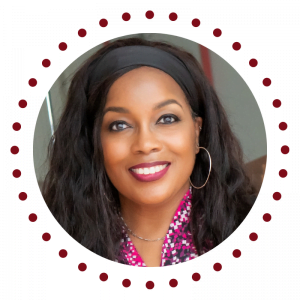
Want Karan to be Your Podcast Guest?
- Blended Workforces & the Gig Economy
- Critical Execution Tactics of High-performing Leaders
- Entrepreneurism & Leading Your Business

Want to be a Podcast Sponsor?
All sponsorships come with a featured spot on show notes pages.
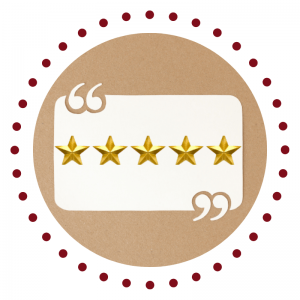
Like the Show? Please Leave a Review
If you like the show, it would mean the world to her if you left a quick review.
Your word is golden, so a HUGE thank you in advance!

#KeepInTouch
via our podcast alerts
Subscribe now to discover why thousands of monthly listeners who are passionate about doing their best work prioritize time each week to listen to the Blended Workforces @Work podcast.
#AboutSDL
#WhereToFindUs
MAILING
4480-H South Cobb Drive
PMB 219
Smyrna, GA 30080
PHYSICAL
2121 NewMarket Parkway
Ste. 108
Marietta, GA 30067
#ContactOptions
Customer Service Email:
service@shockinglydifferent.com
Call or Text:
770-384-1103
#Office Hours
MON-FRI
8:30 AM – 6:30 PM
Weekends By Appointment

